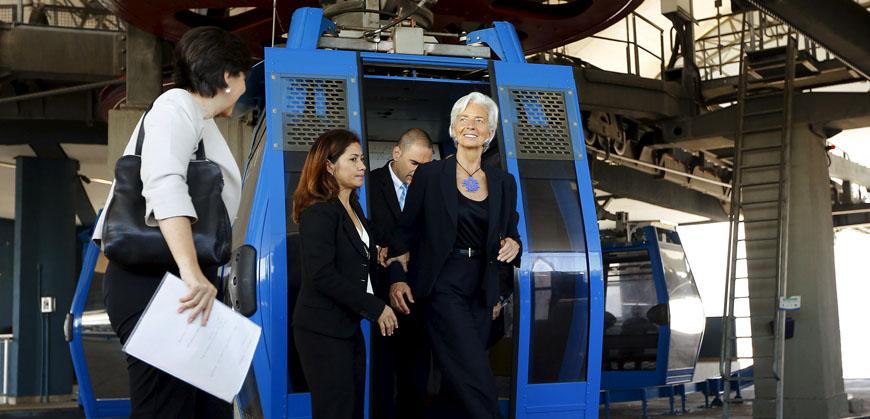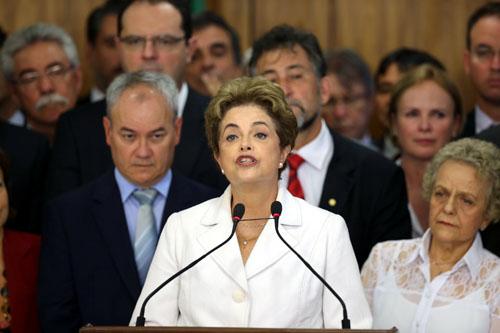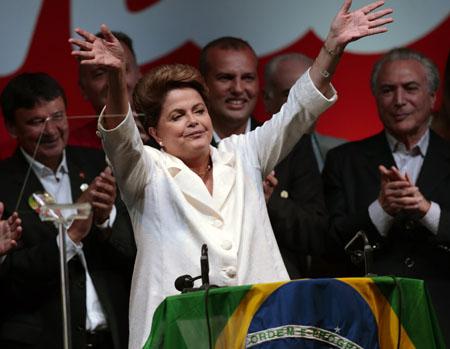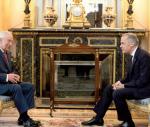You are here
Brazil delivers big spending freeze to regain credibility
By Agencies - May 23,2015 - Last updated at May 23,2015

International Monetary Fund Managing Director Christine Lagarde leaves a cable car during a visit to Alemao slums complex, where she met with social projects, in Rio de Janeiro, last week (Reuters photo)
BRASILIA/RIO DE JANEIRO — Brazil will freeze 69.9 billion reais ($22.58 billion) worth of spending on investment, education and health programmes this year, limiting outlays in a bid to convince investors that President Dilma Rousseff is committed to saving the nation's investment-grade rating.
In addition to cutting the budget, Rousseff earlier on Friday raised the income tax for banks, another sign that her government is ready to push ahead with austerity despite stiff political opposition.
The budget freeze, which was in line with market expectations, was the largest since Rousseff took office in 2011 and will bring discretionary government spending back to levels of 2012.
"This is a big effort that indicates the government willingness to meet our goal," Planning Minister Nelson Barbosa told reporters in Brasilia. "This is the first step for Brazil to return to growth."
Still, most analysts believe the freeze will not be enough to meet Brazil's fiscal surplus goal of 1.1 per cent of the gross domestic product (GDP). The government lowered the goal from 1.2 per cent after a revision to GDP figures of recent years.
Last year's freeze, which is an annual commitment not to spend on already budgeted items, was 44 billion reais.
Barbosa said the government will freeze a total of 21.2 billion reais for education and health, but that priority social programmes will be preserved.
Since winning a close reelection in October, Rousseff has raised taxes on everything from cosmetics to cars and limited spending to rebalance public accounts and shield Brazil's credit rating after years of lavish spending.
That austerity faces fierce resistance from Rousseff's allies in Congress, who believe more tightening will only worsen an expected recession. Lawmakers have watered down two measures cutting pension and unemployment benefits.
To make up for the losses, Rousseff raised the income tax rate for banks to 20 per cent from 15 per cent to collect 4 billion reais in revenues annually.
International Monetary Fund (IMF) chief Christine Lagarde, visiting Rio for a central bank event, applauded Rousseff's austerity drive, saying the freeze "demonstrates the political courage and the determination" to hit the government's target.
As in Europe, fiscal austerity is raising political tensions and starting to weigh on Brazil's once-booming economy.
Economic activity tumbled in the first quarter and unemployment surged to a four-year high, official data showed. Economists expect the Brazilian economy will shrink 1.2 per cent this year, according to a central bank poll.
The head of the IMF encouraged Brazil Thursday to pursue fiscal discipline, saying it was needed to protect social programmes benefitting the poorest members of society.
Lagarde made the link during a visit to Complexo do Alemao, one of Rio's largest and most dangerous slums, and a visible example of the challenges facing Brazil as it struggles with low growth and high inflation.
She chatted with a group of women, who had received government aid and training that enabled them to open small businesses in Complexo do Alemao and other favelas in Rio.
"Fiscal discipline is the necessary basis for financing programmes like these," Lagarde stressed. "They go together, they go hand in hand."
"The people who suffer the most with fiscal indiscipline at the end of the day are generally the poor," she said.
The IMF earlier this year urged Brazil to "strengthen the credibility of economic policy".
The world's seventh largest economy has endured four years of slow growth and this year the IMF predicts a 1 per cent contraction amid rising inflation.
It is now cutting back spending with a goal of producing a surplus of 1.2 per cent of GDP.
Some 60,000 people live in the Complexo do Alemao, grouping 15 favelas where residents often have to run the gauntlet during shootouts between police and drug traffickers.
As well as offering economic advice, Lagarde watched a demonstration of capoeira, an Afro-Brazilian martial art comprising elements of dance and visited a centre where locals sign on to the Bolsa Familia family assistance programme.
The government-financed scheme and other social programmes are credited with lifting tens of millions of Brazilian families out of absolute poverty over the past decade.
To obtain the stipend, families must ensure that their children attend school and participate in vaccine programmes.
Lagarde saluted the Bolsa Familia scheme as having produced "absolutely exceptional" results.
"The fact that Brazil spends 0.5 per cent of GDP on the fight against poverty via its Bolsa Familia is remarkable," she told reporters.
Related Articles
BRASILIA — Suspended Brazilian President Dilma Rousseff vowed on Thursday she would fight to prove her innocence after the senate voted to p
BRASILIA — Brazilian President Dilma Rousseff's government vowed on Monday to fight impeachment after the lower house of congress delivered
Despite opposition from nearly half of Brazil's voters, leftist President Dilma Rousseff won re-election on Sunday and will have another four years to try to revive growth in a once-booming economy gone stagnant.
















